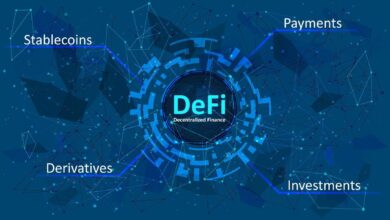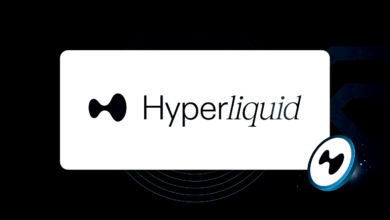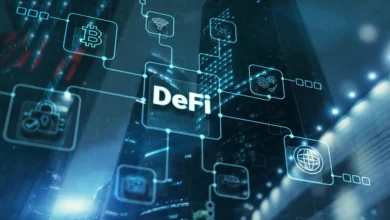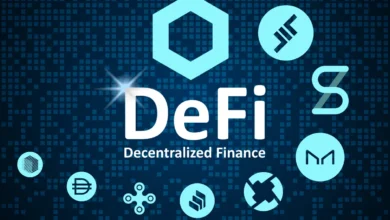Top 10 Enterprise DeFi Solutions Transform Business Growth
How enterprise DeFi solutions transform business growth through blockchain technology, smart contracts, and decentralized finance platforms ..

The financial landscape is experiencing an unprecedented transformation as enterprise DeFi solutions emerge as the Enterprise DeFi Solutions Transform Business cornerstone of modern business innovation. Decentralized Finance, or DeFi, has evolved beyond cryptocurrency speculation to become a sophisticated ecosystem of financial tools that enterprises worldwide are leveraging to optimize operations, reduce costs, and unlock new revenue streams.
Enterprise DeFi solutions represent a paradigm shift from traditional financial systems to blockchain-based financial services that operate without intermediaries. These platforms combine the transparency and security of blockchain technology with the flexibility and efficiency that modern businesses demand. As we navigate through 2025, forward-thinking organizations are discovering that decentralized finance for businesses offers unprecedented opportunities for financial innovation, risk management, and operational excellence.
The adoption of enterprise blockchain solutions has accelerated dramatically, with major corporations recognizing the potential of DeFi platforms for enterprises to streamline treasury management, enhance liquidity, and create new business models. From Fortune 500 companies to emerging startups, organizations are integrating corporate DeFi strategies into their core operations to maintain competitive advantages in an increasingly digital economy.
Smart contracts for businesses have become the backbone of these revolutionary systems, enabling automated financial processes that reduce human error, eliminate intermediaries, and provide real-time transparency. The integration of institutional DeFi services has created a robust infrastructure that supports everything from cross-border payments to complex derivative trading, all while maintaining the security and compliance standards that enterprises require.
Enterprise DeFi: The Foundation of Modern Financial Innovation
What Makes Enterprise DeFi Different from Traditional DeFi
Enterprise DeFi solutions differ significantly from retail DeFi applications in their approach to compliance, scalability, and risk management. While traditional DeFi focuses on individual users and relatively simple transactions, enterprise blockchain solutions are designed to handle the complex financial requirements of large organizations.
The key differentiator lies in the integration of regulatory compliance tools and institutional-grade security measures. DeFi platforms for enterprises incorporate Know Your Customer (KYC) and Anti-Money Laundering (AML) protocols, ensuring that businesses can leverage decentralized finance for businesses while meeting regulatory requirements across multiple jurisdictions.
The Technology Stack Behind Enterprise DeFi
Modern enterprise DeFi solutions are built on sophisticated technology stacks that combine multiple blockchain networks, layer-2 scaling solutions, and hybrid architectures. These institutional DeFi services utilize advanced smart contracts for businesses that can handle high-volume transactions, complex financial instruments, and multi-party agreements with unprecedented efficiency.
The infrastructure supporting corporate DeFi strategies includes enterprise-grade APIs, real-time monitoring systems, and sophisticated risk management protocols. This technological foundation enables seamless integration with existing enterprise systems while providing the flexibility and innovation that blockchain-based financial services offer.
Top 10 Enterprise DeFi Solutions Transforming Business Operations
1. Compound Treasury: Revolutionizing Corporate Cash Management
Compound Treasury stands as a pioneering enterprise DeFi solution that transforms how businesses manage their idle cash reserves. This platform enables corporations to earn yield on their treasury holdings through decentralized finance for businesses, offering returns that significantly exceed traditional savings accounts while maintaining liquidity and security.
The platform’s smart contracts for businesses ensure transparent and automated interest accrual, while its integration capabilities allow seamless connection with existing treasury management systems. Major corporations have reported improved cash flow efficiency and enhanced financial performance through the strategic implementation of Compound Treasury as part of their corporate DeFi strategies.
2. Aave Arc: Institutional-Grade Lending and Borrowing
Aave Arc represents the evolution of DeFi lending into the enterprise space, providing institutional DeFi services that meet the stringent requirements of large organizations. This enterprise blockchain solution offers permissioned lending pools where verified institutions can participate in sophisticated lending and borrowing activities.
The platform’s advanced risk management features and compliance framework make it an ideal DeFi platform for enterprises seeking to optimize capital efficiency. Aave Arc’s integration of regulatory compliance tools ensures that businesses can participate in blockchain-based financial services while maintaining adherence to financial regulations.
3. MakerDAO Institutional Vaults: Decentralized Stablecoin Solutions
MakerDAO’s institutional vaults provide enterprise DeFi solutions for businesses requiring stable, decentralized currency options. These smart contracts for businesses enable organizations to mint DAI stablecoins using various collateral types, creating opportunities for treasury diversification and hedging strategies.
The platform’s governance model and transparent operations make it an attractive option for corporate DeFi strategies focused on stablecoin integration. Enterprises can leverage these institutional DeFi services to reduce exposure to traditional banking risks while maintaining price stability for international operations.
4. Uniswap V3 Enterprise Integration: Advanced Liquidity Management
Uniswap V3 has evolved to serve enterprise needs through sophisticated liquidity management tools designed for decentralized finance for businesses. The platform’s concentrated liquidity features allow corporations to optimize their DeFi platform participation while minimizing impermanent loss risks.
Enterprise blockchain solutions built on Uniswap V3 enable businesses to create custom automated market makers (AMMs) tailored to their specific token pairs and liquidity requirements. This flexibility makes it an essential component of comprehensive corporate DeFi strategies.
5. Centrifuge: Real-World Asset Tokenization Platform
Centrifuge bridges traditional finance with enterprise DeFi solutions through its innovative approach to real-world asset tokenization. This platform enables businesses to tokenize invoices, supply chain assets, and other real-world collateral, unlocking liquidity through blockchain-based financial services.
The platform’s smart contracts for businesses facilitate the creation of asset pools that can be accessed by both traditional investors and DeFi protocols. This hybrid approach makes Centrifuge a crucial institutional DeFi service for companies seeking to optimize working capital management.
6. Goldfinch: Decentralized Credit for Global Businesses
Goldfinch revolutionizes business lending through its unique approach to decentralized finance for businesses. The platform combines on-chain transparency with off-chain credit assessment, creating enterprise DeFi solutions that serve businesses in emerging markets and developed economies alike.
The platform’s innovative use of smart contracts for businesses enables automated loan origination and servicing while maintaining human oversight for credit decisions. This balance makes Goldfinch an effective DeFi platform for enterprises seeking alternative financing options.
7. Ribbon Finance: Automated Options Strategies for Enterprises
Ribbon Finance provides sophisticated options trading strategies through enterprise blockchain solutions that automate complex financial operations. The platform’s yield-generating vaults enable businesses to implement covered call and put-selling strategies without requiring extensive derivatives expertise.
These institutional DeFi services integrate seamlessly with corporate treasury functions, allowing businesses to enhance returns on digital asset holdings while managing downside risk. Ribbon Finance’s approach to corporate DeFi strategies has attracted significant enterprise adoption.
8. Maple Finance: Institutional Credit Marketplace
Maple Finance creates a permissioned lending environment specifically designed for enterprise DeFi solutions. The platform connects institutional borrowers with qualified lenders through smart contracts for businesses that ensure transparent and efficient capital allocation.
The platform’s focus on institutional DeFi services includes comprehensive due diligence processes and sophisticated risk management tools. This approach makes Maple Finance an attractive DeFi platform for enterprises requiring substantial credit facilities.
Also More: Defining a Concept & Creating a New Paradigm for Web3 in 2022
9. Clearpool: Decentralized Capital Markets Infrastructure
Clearpool provides enterprise blockchain solutions that create a decentralized capital markets infrastructure for institutional participants. The platform enables the creation of permissioned liquidity pools where verified institutions can participate in lending and borrowing activities.
The platform’s emphasis on regulatory compliance tools and transparent operations makes it suitable for corporate DeFi strategies requiring institutional-grade infrastructure. Clearpool’s approach to decentralized finance for businesses emphasizes security and compliance without sacrificing innovation.
10. TrueFi: Credit Protocol for Institutional Lending
TrueFi completes our list of transformative enterprise DeFi solutions, focusing on uncollateralized lending for verified institutions. The platform’s smart contracts for businesses enable reputation-based lending, reducing capital requirements while maintaining security.
The protocol’s integration of traditional credit assessment with blockchain-based financial services creates opportunities for businesses to access capital more efficiently. TrueFi’s approach to institutional DeFi services has established it as a leader in enterprise DeFi adoption.
Enterprise DeFi Solutions: Implementation Strategies for Enterprise DeFi Adoption
Developing a Comprehensive DeFi Integration Roadmap
Successful implementation of enterprise DeFi solutions requires a strategic approach that considers regulatory requirements, technical infrastructure, and organizational readiness. Businesses must develop comprehensive corporate DeFi strategies that align with their overall financial objectives and risk tolerance.
The integration process typically begins with pilot programs that test specific DeFi platforms for enterprises in controlled environments. This approach allows organizations to evaluate the effectiveness of blockchain-based financial services while minimizing operational risks.
Risk Management and Compliance Considerations
Enterprise blockchain solutions must incorporate robust risk management frameworks that address the unique challenges of decentralized finance for businesses. Organizations need to implement comprehensive monitoring systems that track protocol risks, smart contract vulnerabilities, and regulatory changes.
The integration of regulatory compliance tools ensures that institutional DeFi services meet the stringent requirements of financial regulators across multiple jurisdictions. This compliance framework is essential for maintaining operational licenses and avoiding regulatory sanctions.
Measuring ROI and Performance Metrics in Enterprise DeFi
Key Performance Indicators for DeFi Implementation
Organizations implementing enterprise DeFi solutions must establish clear metrics to evaluate the success of their corporate DeFi strategies. Key performance indicators include yield generation, cost reduction, operational efficiency improvements, and risk-adjusted returns.
The measurement framework should also consider qualitative benefits such as improved transparency, reduced counterparty risk, and enhanced operational flexibility. These metrics help businesses justify continued investment in DeFi platforms for enterprises and guide future implementation decisions.
Long-term Value Creation Through DeFi Integration
The true value of enterprise blockchain solutions extends beyond immediate financial returns to include strategic positioning for future financial innovation. Organizations that successfully implement decentralized finance for businesses create competitive advantages that compound over time.
Institutional DeFi services enable businesses to participate in the evolution of global financial infrastructure while maintaining operational flexibility and efficiency. This positioning becomes increasingly valuable as blockchain-based financial services continue to mature and expand.
Future Trends and Developments in Enterprise DeFi
Emerging Technologies and Platform Innovations
The future of enterprise DeFi solutions will be shaped by emerging technologies such as zero-knowledge proofs, improved interoperability protocols, and enhanced scaling solutions. These innovations will address current limitations while expanding the capabilities of DeFi platforms for enterprises.
Smart contracts for businesses will become more sophisticated, incorporating artificial intelligence and machine learning capabilities that enable autonomous financial decision-making. This evolution will further streamline corporate DeFi strategies and reduce operational overhead.
Enterprise DeFi Solutions Transform Business
Regulatory Evolution and Compliance Framework Development
The regulatory landscape surrounding institutional DeFi services continues to evolve, with governments worldwide developing frameworks that balance innovation with consumer protection. These developments will create clearer guidelines for enterprise blockchain solutions while potentially expanding market opportunities.
Businesses must stay informed about regulatory changes and adapt their decentralized finance strategies for businesses accordingly. Proactive compliance management will become a key differentiator in successful DeFi implementation.
Conclusion
The transformation of business finance through enterprise DeFi solutions represents one of the most significant developments in modern financial technology. Organizations that strategically implement DeFi platforms for enterprises position themselves at the forefront of financial innovation while capturing tangible benefits, including improved yields, reduced costs, and enhanced operational efficiency.
The ten enterprise blockchain solutions highlighted in this analysis demonstrate the maturity and diversity of available options for businesses seeking to leverage decentralized finance for businesses. From treasury management to credit markets, these platforms provide comprehensive institutional DeFi services that meet the sophisticated needs of modern enterprises.
Success in corporate DeFi strategies requires careful planning, robust risk management, and ongoing adaptation to regulatory developments. Organizations that embrace this financial evolution while maintaining prudent oversight will realize significant competitive advantages as blockchain-based financial services continue to reshape the global economy.
FAQs
Q: What is Enterprise DeFi, and how does it differ from traditional DeFi?
Enterprise DeFi refers to blockchain-based financial services specifically designed for large organizations and businesses. Unlike traditional DeFi that focuses on individual users and simple transactions, Enterprise DeFi incorporates institutional-grade security measures, regulatory compliance tools (including KYC and AML protocols), and advanced risk management frameworks.
Q: What are the main benefits of implementing Enterprise DeFi solutions?
Organizations implementing Enterprise DeFi solutions can experience multiple benefits, including improved yields on treasury holdings, significant cost reductions through the elimination of intermediaries, enhanced operational efficiency through automated processes, and reduced counterparty risk.
Q: Which Enterprise DeFi platforms are leading the market?
The leading Enterprise DeFi platforms include Compound Treasury for corporate cash management, Aave Arc for institutional lending and borrowing, MakerDAO Institutional Vaults for stablecoin solutions, Uniswap V3 for liquidity management, Centrifuge for real-world asset tokenization, Goldfinch for decentralized credit, and Ribbon Finance for automated options strategies.
Q: What are the key considerations for implementing Enterprise DeFi?
Successful implementation requires developing a comprehensive integration roadmap that considers regulatory requirements, technical infrastructure, and organizational readiness. Organizations should start with pilot programs to test platforms in controlled environments before full deployment.
Q: What does the future hold for Enterprise DeFi?
The future of Enterprise DeFi will be shaped by emerging technologies such as zero-knowledge proofs, improved interoperability protocols, and enhanced scaling solutions. Smart contracts will become more sophisticated by incorporating artificial intelligence and machine learning for autonomous financial decision-making. The regulatory landscape continues to evolve with governments developing clearer frameworks that balance innovation with protection.











